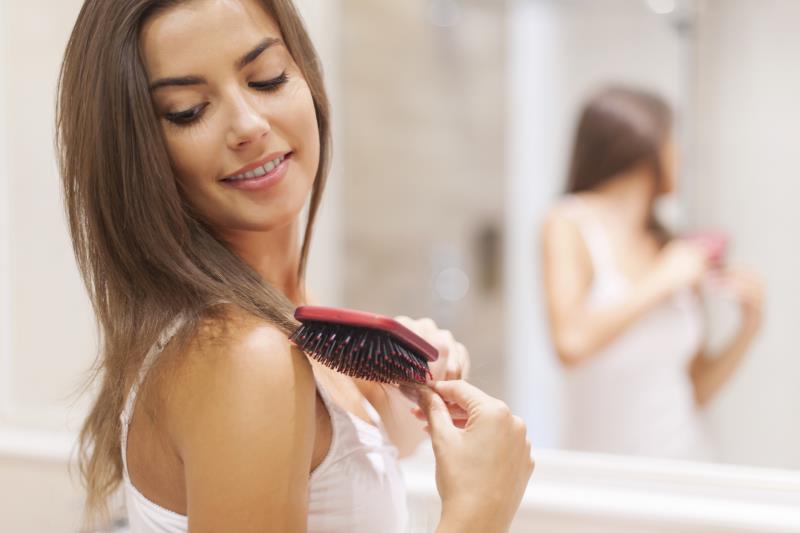The cause of female hair loss, or the causes of hair loss in general are not simple. There is no single, universal answer for every woman, so you will need to look at several possibilities and see which one applies to you.
But be aware that insulin resistance may very well be affecting your hair! Let’s look at some of the most common causes for women to start loosing hair.
Hormonal imbalances
Hypothyroidism, or low thyroid function, is often a culprit in female hair loss. If you are feeling unusually lethargic or apt to gain weight along with losing your hair, low thyroid function may be to blame.
Hair Loss due to PCOS
Another cause of female hair loss is androgenetic alopecia, or male pattern baldness. Why would a woman have male pattern baldness? Because of an excess of male hormones.
All women have male hormones present to some extent, but those with PCOS have more male hormones than they should, which act on the hair follicles the same way they do on men’s hair.

DHT, a male hormone, reacts in the follicles of hair that are genetically inclined to be affected. Just as men inherit the tendency to lose hair, usually from their mother’s side of the family, women can have the same genetic predisposition. An excess of DHT can cause the familiar forehead-and-crown balding pattern seen in men, and is a frequent cause of female hair loss.
Again, this is treatable. First, because you are a woman, you have hormone treatment options available to you that would cause side effects (such as breast growth) in a man. Talk to your doctor. He may prescribe an anti-androgen, (which fights the male hormones) such as spironolactone or finasteride.
Some doctors also prescribe an oral contraceptive (birth control pill) to reduce male hormone levels and clear acne.
Other possible medical treatments include metformin to lower blood sugar levels and reduce cholesterol, which can also help reduce total body weight.
Of course, to normalize blood sugar levels, you will need to take control of your diet to stabilize your blood sugar, reduce cholesterol levels, and get your body weight to a healthy level naturally and long-term.
Prescription medications may be necessary to get you on your way to health, but it is up to you control your insulin resistance.
Prp for preventing hair loss might be a solution to some.
Hair Loss from Autoimmune Disorders
Another possible cause of female hair loss is alopecia areata, which results in patches of hair loss, or alopecia universalis, which is complete loss of all body hair, including eyelashes and eyebrows.
These two fairly uncommon syndromes are thought to be due to immune system dysfunction, and these causes of hair loss may be treated with topical corticosteroids, injecting steroids locally, or with UV light. You will need to see your doctor.
Other Causes of Female Hair Loss
Other possible causes of female hair loss are severe illness, surgery, (particularly anesthesia) malnutrition (due to an extreme diet or vitamin deficiency) diabetes, chemotherapy drugs, and stress. Each of these conditions is treatable, or may simply heal with time.
Another possible cause of female hair loss is post-pregnancy hormonal changes. During pregnancy, hormones keep hair in it’s growing phase, giving pregnant women some of the fullest hair of their lives. After pregnancy, these hormones dissipate, causing diffuse thinning. Try not to worry, this will right itself in a few months.
If hair loss is a concern for you, see your doctor. In the meantime, you may want to follow an inexpensive hair growth protocol or look into products for hair loss.
Apple cider vinegar hair regrowth tonics can also be made very cheaply and easily at home, and actually help make remaining hair look thicker and fluffier.
Don’t despair. You are not alone, and there is help available. If your problem is insulin resistance, you may only need to switch to a clean, natural diet in order to help your hair.










































Stress, improper diet and hormonal imbalances are the major reasons for hair loss among women.